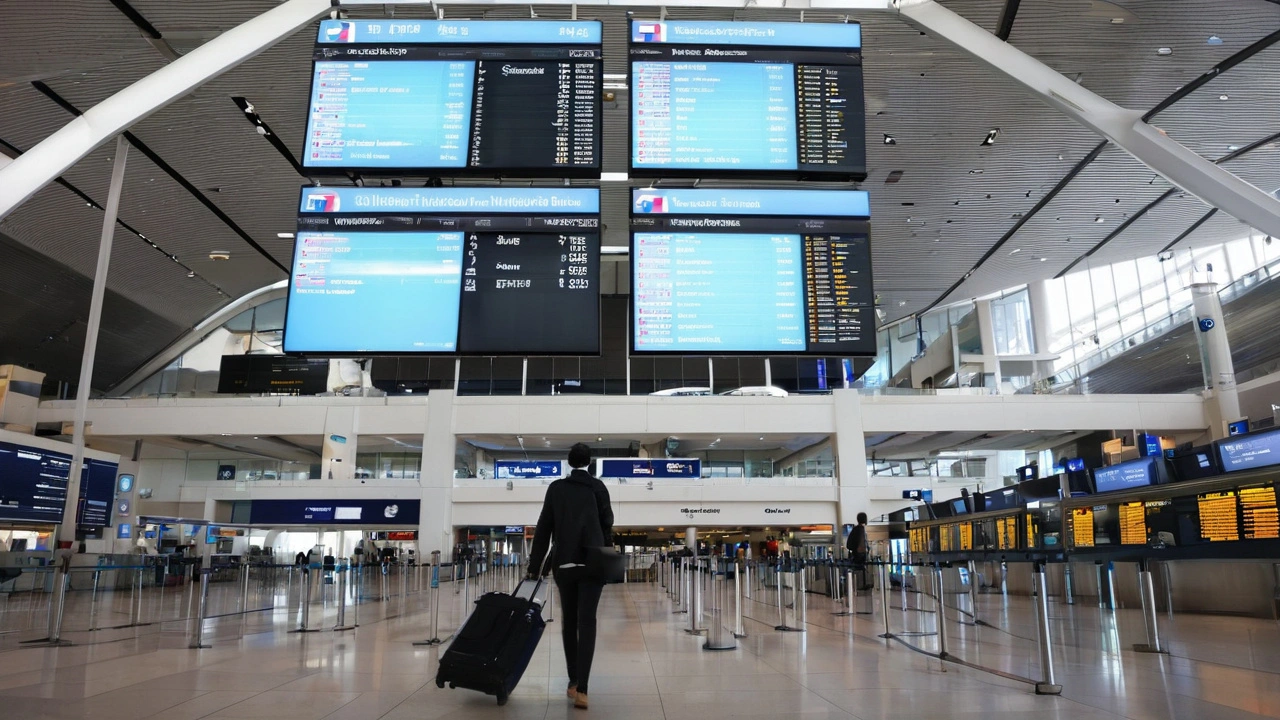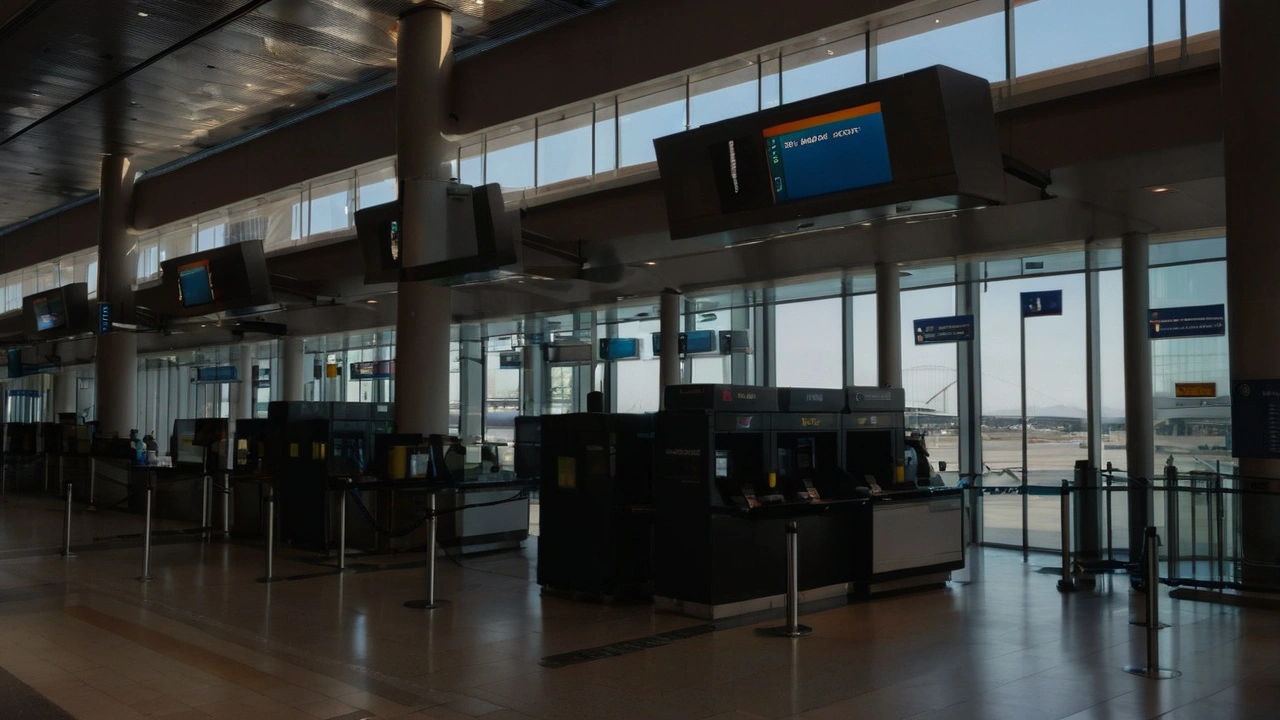Power Outage at Cape Town International Airport Causes Major Disruptions
Sunday evening brought unforeseen havoc to Cape Town International Airport, as a sudden power outage played chaos with air traffic operations. The blackout, which disrupted the crucial runway lights, significantly impacted the airport's ability to manage both landings and takeoffs effectively. Runway lights are indispensable for safe flying, particularly during nighttime and poor visibility conditions. As a result, the usual smooth operations of one of South Africa's busiest airports came to a screeching halt.
The power outage didn’t merely affect the runway lights. Vital services such as airside fire rescue and air traffic navigation were also paralyzed. This trifecta of failures brought about an instant grounding of flights. Airlines were left with no choice but to halt departures and reroute incoming flights to alternate destinations within Airports Company South Africa's extensive network. The scene inside the airport was one of frustration and confusion, as passengers grappled with the sudden changes to their travel plans.
Immediate Response and Efforts to Restore Services
In the aftermath of the blackout, a dedicated team of technicians swung into immediate action. Their primary task was to get to the root of the problem and restore services as quickly as possible. This wasn’t a simple endeavor. Restoring such essential services requires a heightened level of precision and attention to detail, especially when dealing with equipment that ensures safety and a smooth transit for thousands of passengers. The airport authority made it clear that they were working around the clock to bring back normalcy.
While technicians were hard at work to identify and resolve the cause of the outage, other operational challenges continued to amass. By Sunday night, an array of flights were either delayed or diverted, creating a domino effect that ranged across South Africa. FlySafair, one of the primary airlines operating from Cape Town, reported that several of its flights had to be diverted. The ripple effect from the disruption meant that both domestic and international travelers had to brace for considerable delays. Real-time updates were scarce, which left many passengers in the lurch.

Restoration and Resumption of Flights
Finally, relief came at the crack of dawn on Monday. By morning, the significant cause for concern was somewhat alleviated as the restoration efforts bore fruit. Flights started to resume, operations began to climb back to their regular cadence. The runway lights flickered back to life and the air traffic navigation services regained their functional status. As per the updates, 11 aircraft successfully landed by Monday morning, marking a refreshing turn of events for both airport authorities and the stuck passengers.
While the airport resumed normal operations, the incident left behind a trail of concerns and questions. How could such a critical infrastructure face such a debilitating outage? How prepared are airports in mitigating such risks? These questions propelled an inquiry into the incident. A team of experts, paired with seasoned technicians, initiated an in-depth investigation aiming to uncover the precise cause. The investigation would surely scrutinize every possible facet - from systemic faults to potential lapses in maintenance protocols.
Implications and Future Precautions
No incident of this magnitude leaves the involved authorities without a lesson. The Cape Town International Airport authorities have now been charged with the effort of reassessing their risk management frameworks. Power outages at such crucial junctures can not only disrupt passenger plans but also pose significant safety risks. Ensuring a greater level of redundancy within their electrical systems could be a way forward. Creating contingency plans, running periodic drills, and maintaining a reserve stock of essential resources might serve to fortify the preparedness of the airport for similar future incidents.
Passenger reactions to the incident were mixed. While some understood the complexities involved and were appreciative of the timely response, others were rightfully frustrated by the sudden change of plans and lack of readily available information. The airport's customer service and crisis management were brought to the spotlight, urging a probable overhaul to better handle any such future occurrences.

The Road Ahead
As the dust settles, the focus invariably shifts towards the long-term implications of this outage and the lessons it brings with it. Cape Town International Airport, while having quickly resumed operations, stands at a juncture that mandates a re-evaluation of its existing protocols. Risk management, in such high-stake environments, is more than just an obligatory task. It's a constant, evolving requirement, especially in a world where air traffic is only expected to grow.
The aviation industry, by nature, is prone to disruptions. However, the speed and efficiency with which these disruptions are managed is what differentiates world-class services from the ordinary. Cape Town International Airport has a reputation to uphold, and this incident certainly puts its resilience to the test. It's a reminder to all airports globally about the critical nature of airport operations and the slender margin for error they operate within.
In the end, what remains clear is that while the power outage was a severe operational setback, the recovery was swift and efficient. The teamwork exhibited by the technical crew, air traffic controllers, and ground staff deserves commendation. Their collective efforts ensured that what could have been a prolonged debacle was managed within hours, and regular operations were restored with minimal extended disruption. For passengers and airlines alike, this sense of quick recovery and transparency is key to fostering trust and maintaining smooth, reliable operations in the future.
As more details emerge from the ongoing investigation, passengers and industry experts alike will be keenly following the outcomes. The Cape Town International Airport outage serves as a case study in dealing with unexpected crises and showcases the resilience needed in the domain of air travel. Looking ahead, the findings from this incident may well shape new policies and better-prepared infrastructures for airports worldwide.


 Sports
Sports
Chris Ward
July 29, 2024 AT 18:14Thats wild how a simple blackout can shut down an entire airport.
Heather Stoelting
August 11, 2024 AT 11:47What a chaotic Sunday night for Cape Town travelers! The power cut knocked out runway lights and ATC gear so planes had to circle or divert. It shows how fragile modern air travel really is but also how crews can rally fast. Kudos to the tech crews pulling all‑nighters to get lights back on.
Travis Cossairt
August 24, 2024 AT 05:21Ehh the whole thing kinda feels like a reminder that airports run on a single switch. When it went out everything froze. Guess they’ll look into backup generators now.
Amanda Friar
September 5, 2024 AT 22:54Oh great, another perfect example of why we should never trust “state‑of‑the‑art” infrastructure. The blackout turned a bustling hub into a parking lot for angry passengers. I’m sure the airlines loved juggling those last‑minute reroutes. At least the drama gave the staff something to do besides waiting. #AirTravelAdventure
Sivaprasad Rajana
September 18, 2024 AT 16:27The outage highlights how dependent we are on electricity for safety. When lights go out, pilots lose a vital reference, and the whole system slows. It also teaches that redundancy is not optional but essential. Airports should treat power as a living system that needs regular check‑ups. In the end, the swift recovery shows the value of trained teams.
Andrew Wilchak
October 1, 2024 AT 10:01Seriously though, the staff handled the chaos better than most people could imagine. Their quick actions prevented any major accidents.
Roland Baber
October 14, 2024 AT 03:34Your point about redundancy hits home, especially when we consider that a single point of failure can cascade into a network‑wide shutdown. Think of the airport as an ecosystem where every component supports the next; pull one thread and the whole tapestry wobbles. The technicians who restored the runway lights demonstrated not just skill but also the importance of regular drills. By simulating outages, crews can rehearse the exact steps needed to bring systems back online safely. So, investing in backup generators and routine stress tests isn’t just a bureaucratic checkbox – it’s a safeguard for thousands of passengers and crew.
Phil Wilson
October 26, 2024 AT 21:07The Cape Town International Airport incident serves as a textbook case of systemic vulnerability in high‑throughput aeronautical infrastructures.
When the primary sub‑station failed, the cascade effect manifested across multiple missions‑critical subsystems, including the aeronautical lighting network, fire suppression monitoring, and ATC communications.
The immediate loss of runway illumination triggered an automatic “ground stop” protocol embedded in the airport's operational contingency matrix.
Concurrently, the redundancy pathways designed for electrical backup were either insufficiently provisioned or improperly engaged, leading to a prolonged re‑initialization sequence.
From a safety management perspective, the incident underscores the necessity of layered resilience, where mechanical, electrical, and procedural safeguards are harmonized.
The technical crew’s deployment of portable generator sets restored baseline power to the navigation beacons within approximately ninety minutes.
Simultaneously, the air traffic management team executed a manual separation scheme, relying on radar vectors and procedural holds to maintain safe distances between airborne assets.
Passenger flow was rerouted through auxiliary terminal facilities, with real‑time information disseminated via both mobile push notifications and on‑site digital signage.
Communication gaps, however, were evident; the delay in public announcements contributed to heightened passenger anxiety and operational bottlenecks.
Post‑incident analysis will likely focus on the integrity of the airport’s uninterruptible power supply (UPS) architecture, as well as the robustness of its fail‑over testing regime.
Industry best practices suggest a minimum of 30‑minute autonomous operation capability for all critical lighting and communication equipment.
Moreover, integrating predictive maintenance algorithms could preemptively flag voltage irregularities before they precipitate a full outage.
The incident also provides a valuable data point for regulatory bodies assessing compliance with ICAO Annex 14 standards concerning aerodrome lighting reliability.
In the broader context, this event reminds stakeholders that even well‑funded hubs are not immune to single‑point failures without a comprehensive risk mitigation strategy.
Ultimately, the swift restoration effort demonstrates that with appropriate expertise and resource allocation, system recovery can be achieved with minimal long‑term disruption.
Roy Shackelford
November 8, 2024 AT 13:41Looks like a classic case of sabotage aimed at hurting our tourism revenues. Someone didn’t want Cape Town to shine.
Karthik Nadig
November 21, 2024 AT 07:14The whole blackout felt like a scene from a thriller – lights out, chaos, and everyone scrambling 😱. If they don’t upgrade their backup plans soon, we’ll see more drama like this 😂.
Charlotte Hewitt
December 4, 2024 AT 00:47Just another reminder that the powers that be love to keep us guessing about what’s really behind these outages.
Jane Vasquez
December 16, 2024 AT 18:21Oh wow, the airport finally got its act together after an 'oh no' moment 🙄. Guess we should all applaud the heroes who turned on a few lights. #NotImpressed
Hartwell Moshier
December 29, 2024 AT 11:54Good to see the airport back in operation the staff did a solid job
Jay Bould
January 10, 2025 AT 17:03It’s great to see South Africa’s main gateway bounce back so quickly – a testament to the dedication of the people who keep the skies safe.